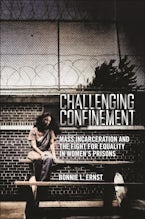Examines how the feminist movements in the late twentieth century ignited prison protests, activism, and reform in women’s prisons
While the late twentieth century brought about greater rights for women, it also saw a rapid increase in the number of female prisoners. Before their confinement, many incarcerated women had gained access to work and higher education. But once behind bars, they found the only programs available for them perpetuated misogynistic norms.
Challenging Confinement is about how incarcerated women incorporated strategies from feminist movements into their activism behind bars. Facing long sentences, overcrowded prisons, and a lack of rehabilitation programs, incarcerated women protested, organized, and filed lawsuits to advocate for gender and racial equality in prison. Drawing on prison grievance reports, oral histories, state archives, and private collections, Bonnie L. Ernst tells the story of how women's movements, beginning in the 1920s and ending in the era of mass incarceration, infused prison activism in Michigan with new energy. Female prisoners and attorneys successfully persuaded the federal court to force state prisons to offer more programming and access to legal services. Mass incarceration swallowed up many of those efforts, but this history demonstrates how core principles of women’s movements encouraged incarcerated women to form coalitions and challenge their jailers. By bringing together histories of race, gender, and punishment, Challenging Confinement reveals how incarcerated women worked together to resist, in an era of mass imprisonment.

